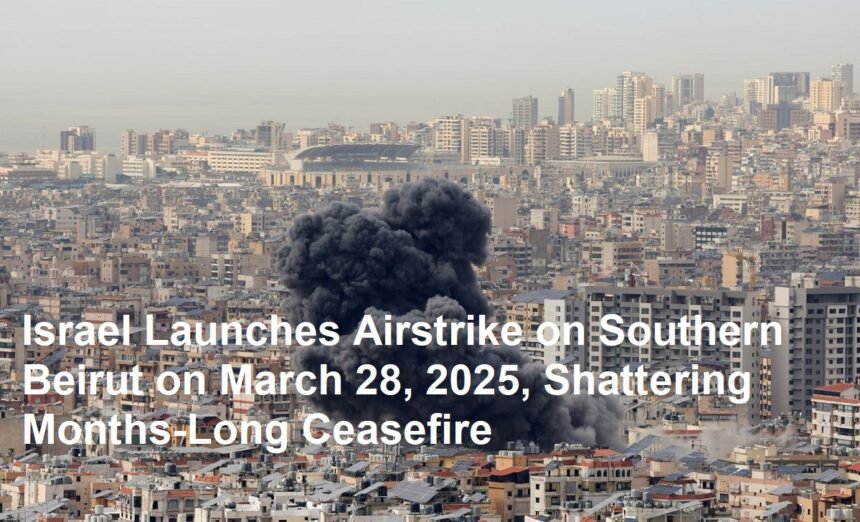In a dramatic escalation of regional tensions, Israeli military forces conducted an airstrike targeting southern Beirut on Friday, March 28, 2025. This marks the first known aerial assault on the Lebanese capital since a ceasefire was brokered with Hezbollah in November 2024. The operation has sparked immediate international concern and renewed debates over the fragile state of peace in the region.
According to military sources, the airstrike was aimed at what Israel described as “military assets” believed to be used by Hezbollah operatives. Israeli officials have maintained that the operation was a measured response to intelligence indicating imminent threats from militant positions in southern Beirut. The strike, carried out with precision-guided munitions, reportedly inflicted damage on several targets, although details on the extent of the damage have yet to be independently verified.
Lebanese authorities in Beirut have confirmed that the airstrike struck multiple locations in the southern part of the city. Emergency services rushed to the scene as residents reported structural damage and the sound of explosions shaking the area. While initial reports indicate that there were some casualties, Lebanese officials have yet to release a definitive count. The government has called for calm and promised a full investigation into the incident, urging the international community to help de-escalate tensions.
The timing of the airstrike has raised concerns among regional experts. The ceasefire with Hezbollah, established in November 2024, was widely seen as a critical step toward reducing hostilities in an area frequently marred by conflict. For months, there had been cautious optimism about a reduction in violence and a potential move toward more durable peace negotiations. However, Friday’s operation has quickly dispelled those hopes, suggesting that underlying tensions and unresolved issues continue to simmer beneath the surface.
Israeli officials have defended the strike as a necessary act of self-defense, insisting that their military must remain vigilant against any actions that might threaten national security. “We have clear intelligence that indicates a buildup of hostile elements in the area,” an Israeli defense spokesperson said in a brief statement. “Our objective is not to escalate conflict unnecessarily but to neutralize potential threats before they can harm our citizens.”
The airstrike has elicited sharp reactions from various international actors. Western governments, which have long been engaged in efforts to mediate peace between Israel and its regional adversaries, have called for restraint on both sides. The United Nations has scheduled an emergency meeting to discuss the implications of the strike, with many diplomats warning that such actions could trigger a broader escalation if not addressed swiftly and carefully.
In Beirut, the mood is one of apprehension and uncertainty. Local residents, already weary from years of instability, expressed fear that the incident could mark the beginning of renewed hostilities between Israel and Hezbollah. Community leaders and civil society groups have called for immediate dialogue and international mediation to prevent a full-blown conflict that could devastate the already vulnerable civilian population.
Analysts have noted that the operation may be part of a broader recalibration of Israel’s security policy in the region. Some believe that the strike could signal a willingness to use military force more decisively if intelligence suggests that the ceasefire is being undermined by covert preparations for renewed conflict. Others caution that the move could be a dangerous provocation, potentially drawing Hezbollah back into active hostilities and destabilizing an already volatile region.
As the international community awaits further details and responses, Friday’s airstrike stands as a stark reminder of the persistent volatility in the Middle East. While diplomatic channels remain open, the incident underscores the ongoing challenges of maintaining peace in an environment where trust is fragile and the stakes remain incredibly high. Both sides now face mounting pressure to manage their next moves carefully, as any misstep could ignite a conflict with far-reaching consequences.












